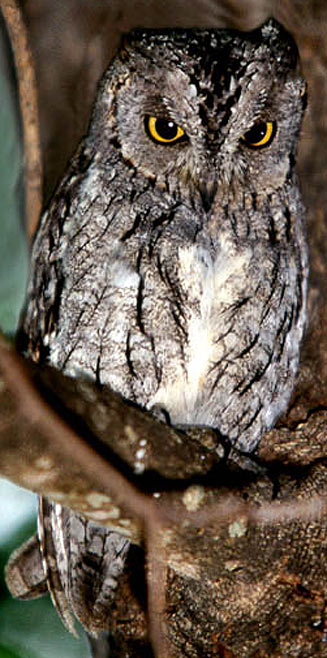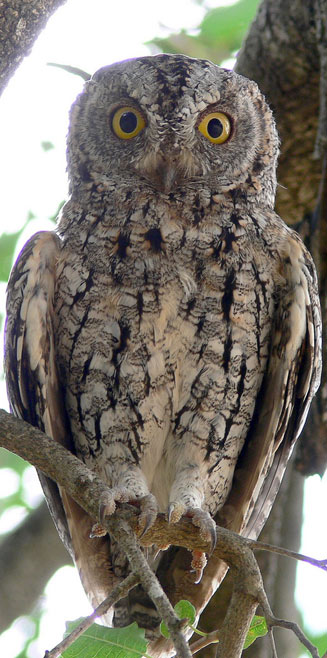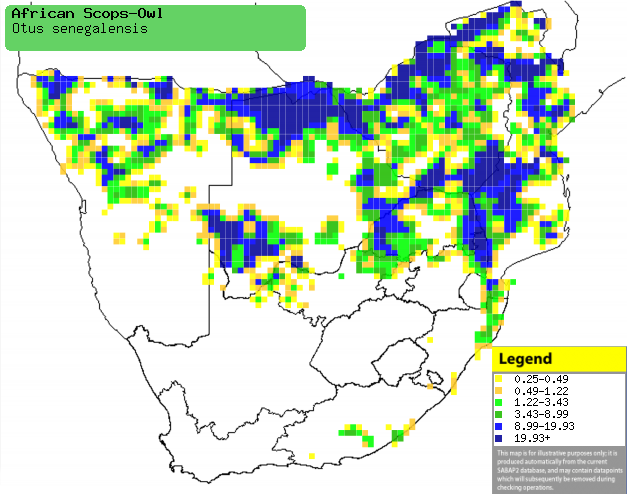|
Otus senegalensis (African
scops-owl)
Skopsuil [Afrikaans]; Kakuru (also applied to other
owl species) [Kwangali]; Chipotonho [Shona]; Xikhotlwana (also applied to Marsh
owl) [Tsonga]; Lerubisana (applied to a number of other owl species) [Tswana];
Afrikaanse dwergooruil [Dutch]; Petit-duc africain [French]; Afrikanische
zwergohreule [German]; Mocho-de-orelhas-africano [Portuguese]
Life
> Eukaryotes >
Opisthokonta
> Metazoa (animals) >
Bilateria >
Deuterostomia > Chordata >
Craniata > Vertebrata (vertebrates) > Gnathostomata (jawed
vertebrates) > Teleostomi (teleost fish) > Osteichthyes (bony fish) > Class:
Sarcopterygii (lobe-finned
fish) > Stegocephalia (terrestrial
vertebrates) > Tetrapoda
(four-legged vertebrates) > Reptiliomorpha > Amniota >
Reptilia (reptiles) >
Romeriida > Diapsida > Archosauromorpha > Archosauria >
Dinosauria
(dinosaurs) > Saurischia > Theropoda (bipedal predatory dinosaurs) >
Coelurosauria > Maniraptora > Aves
(birds) >
Order: Strigiformes
> Family: Strigidae
 |
 |
|
African scops-owl. [photo
Callie de Wet ©] |
African scops-owl, Kruger National Park, South
Africa. [photo Tony Faria ©]. |
The African scops-owl can be found in many places in
southern Africa, being most abundant in central Namibia, Botswana and
north-eastern South Africa. It usually lives in arid savanna woodland. It can also be found
in valley bushveld in the Eastern cape. Being only 14-18 cm high, it mainly
eats invertebrates, with the remainder being made up of small birds, mammals and
reptiles. It usually nests in cavities in trees. It lays 2-4 eggs that are incubated by the
female, while the male hunts. The eggs hatch after about 22 days, and the chicks
remain in the nest for 25-28 days, after which they leave the nest for the
surrounding bush.
Distribution and habitat
Occurs across sub-Saharan Africa, excluding the equatorial
forest of West Africa and the DRC. In southern Africa it is locally common in
northern and central Namibia, Botswana, Zimbabwe, Mozambique and northern and
south-eastern South Africa. It generally
prefers arid savanna woodland, especially with Mopane (Colosphermum mopane) trees or
Acacia parklands, usually with
nearby rivers or streams. It may also move into
valley bushveld among coastal forest and grassland.
|
 |
|
Distribution of African scops-owl in southern Africa,
based on statistical smoothing of the records from first SA Bird Atlas
Project (©
Animal Demography unit, University of
Cape Town; smoothing by Birgit Erni and Francesca Little). Colours range
from dark blue (most common) through to yellow (least common).
See here for the latest distribution
from the SABAP2. |
Food
It eats mainly arthropods, supplemented with small birds,
mammals and reptiles. It hunts by flying from perch to perch, trying to locate prey. Once prey is spotted, it swoops down
and grabs the animal with its talons. If it misses it will sometimes pursue its
quarry on the ground.. The following prey items have been recorded
in its diet:
- Invertebrates
- Vertebrates
- small birds
- mammals
- reptiles
- amphibians
Breeding
- Mainly nests in natural tree cavities 1.2-9 m above
ground, usually where the trunk has snapped off, a
branch has broken off, or a hole has been rotted in into the tree. It also nests
in holes made by woodpeckers, cavities among sticks of old vulture nests and
nest boxes.
- Egg-laying season is from June-November.
- It lays 2-4 eggs, which are incubated by the female for about 22 days. The male
hunts for both of them, usually bringing five prey items an hour to the nest,
usually at dusk or dawn.
- For the first 12 days of
their life they are brooded by the female, after which both sexes do the
hunting, often bringing 70 prey items a night to the nest. The chicks leave
the nest when they are 75% of the adult size, at about 25-28 days old.
Threats
Not threatened, but possibly impacted by bush clearance and
overgrazing in the Eastern Cape's valley bushveld.
References
-
Hockey PAR, Dean WRJ and Ryan PG (eds) 2005. Roberts
- Birds of southern Africa, VIIth ed. The Trustees of the John Voelcker
Bird Book Fund, Cape Town.
|
